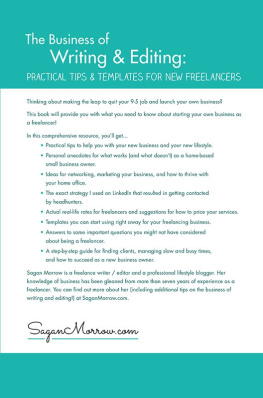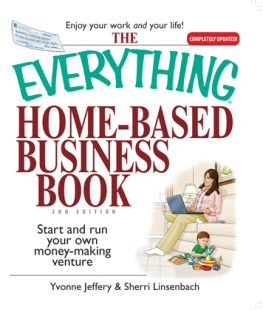how to start a home-based
Editorial Services Business
Copyright 2013 by Morris Book Publishing, LLC
ALL RIGHTS RESERVED. No part of this book may be reproduced or transmitted in any form by any means, electronic or mechanical, including photocopying and recording, or by any information storage and retrieval system, except as may be expressly permitted in writing from the publisher. Requests for permission should be addressed to Globe Pequot Press, Attn: Rights and Permissions Department, PO Box 480, Guilford, CT 06437.
Levels of Copyediting in chapter 2 and Appendix B reprinted with permission of Barbara Fuller. Appendix A reprinted with permission of Editcetera.
Interior spot art licensed by Shutterstock.com
Editorial Director: Cynthia Hughes Cullen
Editor: Tracee Williams
Project Editor: Lauren Brancato
Text Design: Sheryl P. Kober
Layout: Casey Shain
Library of Congress Cataloging-in-Publication Data is available on file.
ISBN 978-0-7627-7882-9
Printed in the United States of America
10 9 8 7 6 5 4 3 2 1
This books purpose is to provide accurate and authoritative information on the topics covered. It is sold with the understanding that neither the author nor the publisher is engaged in rendering legal, financial, accounting, and other professional services. Neither Globe Pequot Press nor the author assumes any liability resulting from action taken based on the information included herein. Mention of a company name does not constitute endorsement.
Making the Decision
Do You Really Want to Be a Home-Based Editor?
In my home region of the San Francisco Bay Area, publishing is relatively big business. Its not as big here as in New York, but opportunities abound for those who look for them. With thirty-eight publishers listed for San Francisco in the 2012 edition of Literary Market Place (LMP), and with more in the nearby cities, we are putting out plenty of books.
Add to those books a handful of magazines also published in my area, and the word count rises. Then add numerous trade journals, government reports, and university publications, and you see the demand. Outside of traditional publishing and publications, we find a need for editors to work on everything from documentation associated with the tech industry of the Silicon Valley to the small-print literature packed in medications sold over the counter. Since the 1990s, we have also seen a profusion of print on the web and an influx of self-published works by everyone from grandfathers publishing memoirs to business executives broadcasting their expertise. More and more people are writingand many of these people value the editors professional eye.
This is my home ground, the San Francisco Bay Areaone of the bigger publishing centers of the country but not close to the top. Take those thirty-eight publishers in San Francisco and multiple by ten, and you start to approach what New York City holds. Throughout the country, according to LMP listings, more than twenty-five hundred publishers are hard at work producing pages. Many of these publishers have always counted on freelancers to meet their needs for proofreading, copyediting, and indexing. Some also depend on freelancers to provide other editorial services, such as development or production. And publishers publish only a small share of the material that goes into print every day; self-publishing, print-on-demand, and the World Wide Web are other means of production and distribution.
You see the point. Theres a lot of work. The problem? Working with words appeals to many, many people, including English majors as well as other word lovers who have developed a skill through a variety of channels. You wont find editing listed in university catalogs as an undergraduate degree, yet educated people of many disciplines claim the profession. According to the US Labor Department, Strong competition is expected for salaried editing jobs because many people want to work in the media industry. So the facts are (1) US businesses publish a lot of words, (2) a lot of those words need editors, (3) a lot of people want to edit those words, and (4) staff jobs are relatively scarce.
The good news is that many businessespublishers and others alikecontinue to recognize the need for a good editor to make communications clear even if they dont hire editors on staff. These businesses look for talented freelancers, and while some ask freelancers to work on-site in makeshift cubicles when needed, many send work over the Internet for completion at a remote office. Even if you dont live in a publishing hub like New York Cityor in a community with a single publisher listed in the Yellow Pagesyou can still get work over the Internet. Well-established freelancers in rural areas of Middle America can stay busy with clients from afar, and even some who have moved temporarily outside the national boundaries have maintained their US clients. As of 2012, 16 percent of all editors were self-employed, and that rate is expected to remain stable through 2020, according to the US Department of Labor/Employment and Training Administration.
So plenty of work is available specifically for home-based editors. But just as for staff jobs, many editors want that home-based work. This means that only those with the sharpest skills and the best and most professional business practices get the work. Many editors do make a comfortable living from a home office; some are able not only to pay their bills but to choose the jobs that most appeal to them. But those editors havent happened into that success; they have worked hard for it, and they have been smart about how they developed their business. Other wannabe freelance editors have given upsome because they didnt have the editorial skills and others because they didnt have the business know-how. The trick is to make yourself one of the many skilled and business-savvy editors who succeed.
If you persist and succeed, you will find a rewarding line of work. The decision now is whether you want the career and lifestyle that comes with it enough to do what it takes. If you are considering moving into freelance editing, make sure you know what that means. This chapter explores the pros and cons of home-based editorial work as well as the necessary qualities of a freelance editor.
Why Edit?
The first question to ask is whether you really want to edit at all. Do you love to work with words? Love to help bring out the best in writingwhether by shaping the manuscript as a whole or by nitpicking over every comma and hyphen until all are perfect? In chapter 2, Envisioning the Business, well discuss types of editing that might appeal to you as well as different types of publications and potential clients. For now, lets assume you have already chosen the field of editing and are deciding whether to work out of your home as a freelancer.
Keep in Mind
The good news: People are always writing, and writing requires editing. The bad news:
Competition for editorial work is fierce.
Why Freelance? The Pros
What exactly is a freelancer? A freelancer is a self-employed professional who provides services to a variety of clients without a long-term commitment to any of them;








